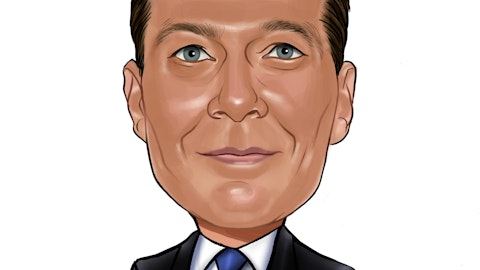Alec Scheibelhoffer: Great, thank you for the color there. And then — just as a second question here, if you could just remind us or talk a little bit about the mobile camp demobilization that hit in 2023 and how much it lingers into ’24. I think you said $6 million, but if you could just refresh my memory on that. That would be great.
Bradley Dodson: So let me be clear for everyone. So on the mobile camps, we had $10 million of demobilization expenses that will run through EBITDA in 2023 and $6 million that will run through EBITDA in 2024. As it relates to the demobilization costs related to McClelland, that will flow through other income and expense line item, along with the proceeds from selling those assets. So little confusing as we’ll talk about demob in both cases, but we’ll try and be clear.
Alec Scheibelhoffer: Great and that’s all for me. I’ll turn it back. Thank you.
Bradley Dodson: Thank you very much. Thanks for your questions.
Operator: Our next question comes from the line of Dave Storms with Stonegate Capital Markets. Please proceed with your question.
David Storms: Good morning.
Bradley Dodson: Good morning.
David Storms: Just one quick one on McClelland Lake. Are there any contingencies there that we should be aware of, any earnest money that may or may not be material?
Bradley Dodson: There were some deposits that were put in place upon signing the agreement, and we’re paid as soon as the units are truck ready on location in Alberta. As it relates to the sale of the assets, as it relates to the transportation, those will be — start to be recognized in the fourth quarter as we move the assets from Alberta down to the Western U.S.
David Storms: Understood. Appreciate it. And then it looks like over the last four quarters, the EBITDA contribution from Australia and Canada has been about a 50-50 split. Is this a trend we should think about going forward? Or do you think that there’s a potential for that split to diverge a little?
Bradley Dodson: Well, because of the loss of the McClelland earnings and the Mobile Camp earnings in Canada, it will shift in 2024. And as highlighted in the comments, we’re working to — on earnings replacement for Canada. That will take some time.
David Storms: Understood. Thank you. And then just one more, and I think you touched on this a little bit earlier, but your leverage ratio is below that 1x target. Is this gearing up for something? Or is this just the normal fluctuations of the leverage ratio through the cycle?
Bradley Dodson: I would say it’s normal fluctuations. Our free cash flow historically, and we expect this trend to continue is usually strongest in the second half of the year. The reasons for that are you ramp up in the first half of the year, receivables go up, have the start of the turnaround seasons predominantly in Canada, but Australia as well in the second quarter. And then those receivables start to unwind in the second half of the year. So we had strong free cash flow in the quarter. We expect to have strong free cash flow in the fourth quarter. And then on top of that, you’ve got the net proceeds from McClelland coming through. So I would say it’s just normal fluctuations exacerbated or enhanced, not exacerbated enhanced by the proceeds from the McClelland sales. So I do expect it to temporarily go below our range, and then we expect to deploy that and growth efforts in 2024.
David Storms: Understood, that’s very helpful. Thank you for taking the questions.
Bradley Dodson: Absolutely. Thank you.
Operator: There are no further questions in the queue. I’d like to hand the call back to Bradley Dodson for closing remarks.
Bradley Dodson: Thank you and thank you all for joining us on the call today. We appreciate your interest in Civeo, and we look forward to speaking with you on the fourth quarter and full-year earnings call, which we expect to do in February.
Operator: Ladies and gentlemen, this does conclude today’s teleconference. Thank you for your participation. You may disconnect your lines at this time and have a wonderful day.
Follow Civeo Corp (NYSE:CVEO)
Follow Civeo Corp (NYSE:CVEO)
Receive real-time insider trading and news alerts




